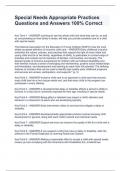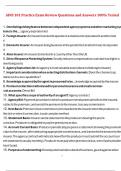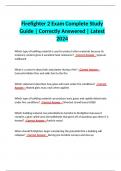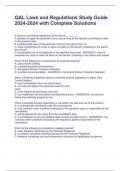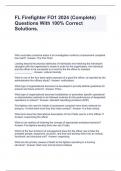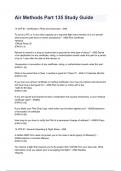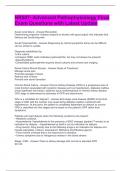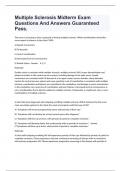Key Term 1 - ANSWER-Learning to see the whole child and what they can do, as well as concentrating on their family's needs, will help you provide excellent care to a child with special needs.
The National Association for the Education of Young Children (NAEYC) has the most widely accepted definition of inclusive child care: - ANSWER-Early childhood inclusion embodies the values, policies, and practices that support the right of every infant and young child and his or her family, regardless of ability, to participate in a broad range of activities and contexts as full members of families, communities, and society. The desired results of inclusive experiences for children with and without disabilities and their families include a sense of belonging and membership, positive social relationships
and friendships, and development and learning to reach their full potential. The defining features of inclusion that can be used to identify high quality early childhood programs and services are access, participation, and supports." (p. 2)
Key Point 2 - ANSWER-Inclusive child care is an approach to child care that ensures every child has his or her unique needs met, and that every child in the program can participate in every offering.
Key Point 3 - ANSWER-A developmental delay or disability affects a person's ability to function in a way that is commonly expected for their age, resulting in special needs.
Key Point 4 - ANSWER-Being gifted or talented may impact a child's attention and behavior in a classroom of peers who are developing typically.
Key Point 5 - ANSWER-Early intervention refers to services that mitigate a delay or disability.
Key Point 6 - ANSWER-Developmentally appropriate practice involves knowing child development in general, along with each child's cultural and individual needs.
Key Point 7 - ANSWER-Support services can improve the quality of life for a child with a
delay or disability.
Key Point 8 - ANSWER-If you suspect a child may have a delay or disability, refer the parents to the Florida Diagnostic & Learning Resources System.
Key Point 9 - ANSWER-Making a reasonable effort to accept a child with special needs means you are complying with the Americans with Disabilities Act, a federal law. gifted - ANSWER-Cognitively or developmentally advanced.
Inclusion - ANSWER-The idea that activities and environments should be made accessible for all children .
Natural Environment: - ANSWER-A place where you would typically see children living, playing, and learning.
Talented - ANSWER-Having a special ability not typically seen in peers.
Americans with Disabilities Act (ADA) - ANSWER-A federal law that prohibits businesses from discriminating against people with disabilities.
Developmentally Appropriate Practice - ANSWER-Involves knowing child development, along with each child's cultural and individual needs
Support Services - ANSWER-Services offered by agencies to help children with disabilities.
Early Intervention - ANSWER-Refers to services that mitigate a delay or disability.
Disability - ANSWER-Causes life-long impacts in major life activities.
Delay - ANSWER-Usually overcome by adulthood, especially with early intervention.
Key Point 10 - ANSWER-To use People First Language, mention the person before the condition and avoid using prejudicial language.
Key Point 11 - ANSWER-Having sympathy or empathy for the children in your care, and
for their families, is a key part of providing quality inclusive child care and will help you remember to use People First Language.
Key Point 12 - ANSWER-Since every child has unique needs that can vary from day to day and throughout each day, it is important that child care professionals strive to know and meet the changing needs of all individuals in their care.
Key Point 13 - ANSWER-Ignoring, infantilizing, and objectifying are all ways of showing prejudice toward children with special needs.
Key Point 14 - ANSWER-Child care professionals must be models of acceptance and tolerance.
Key Point 15 - ANSWER-Empowering children helps them cope with the stereotypical attitudes and behaviors of other people.

